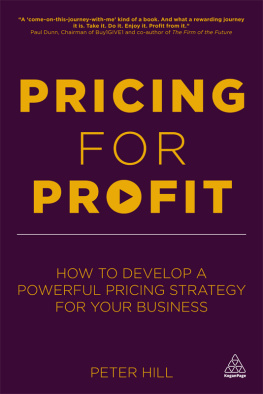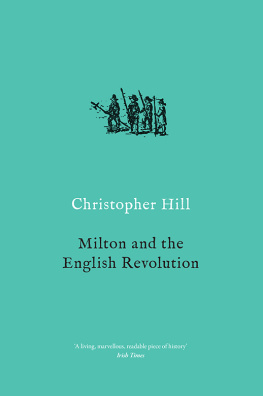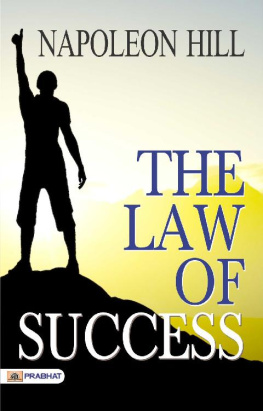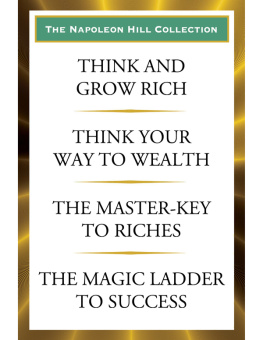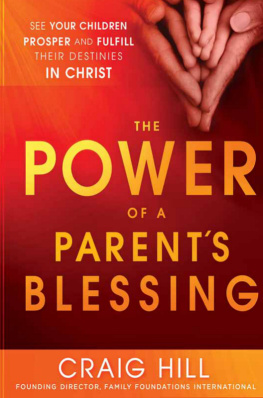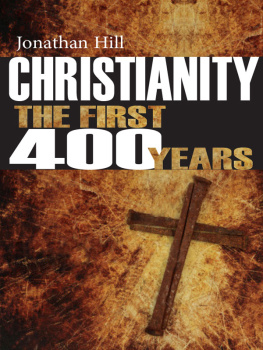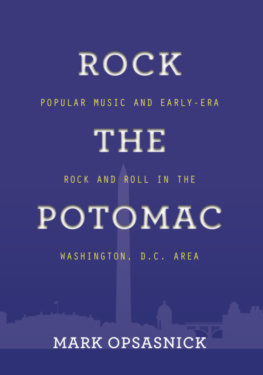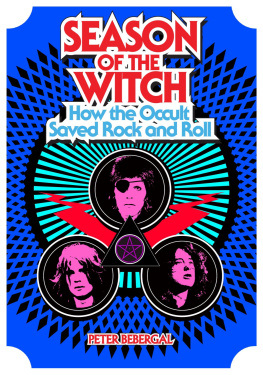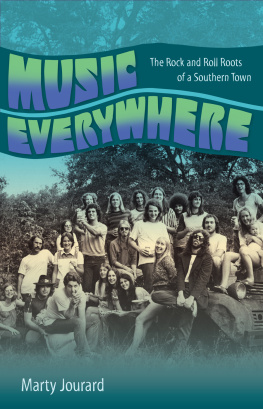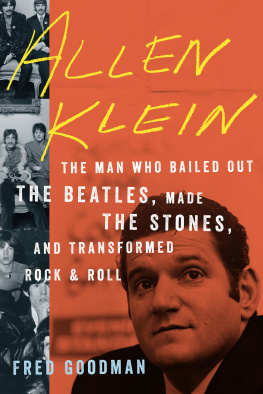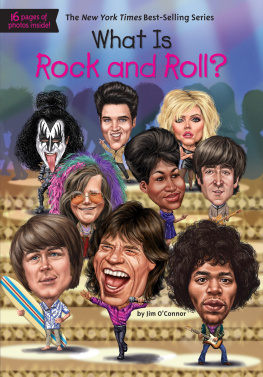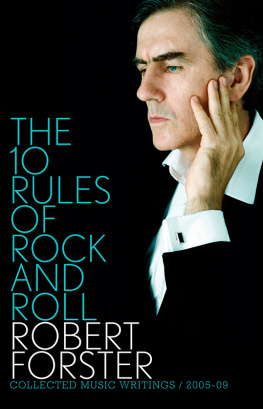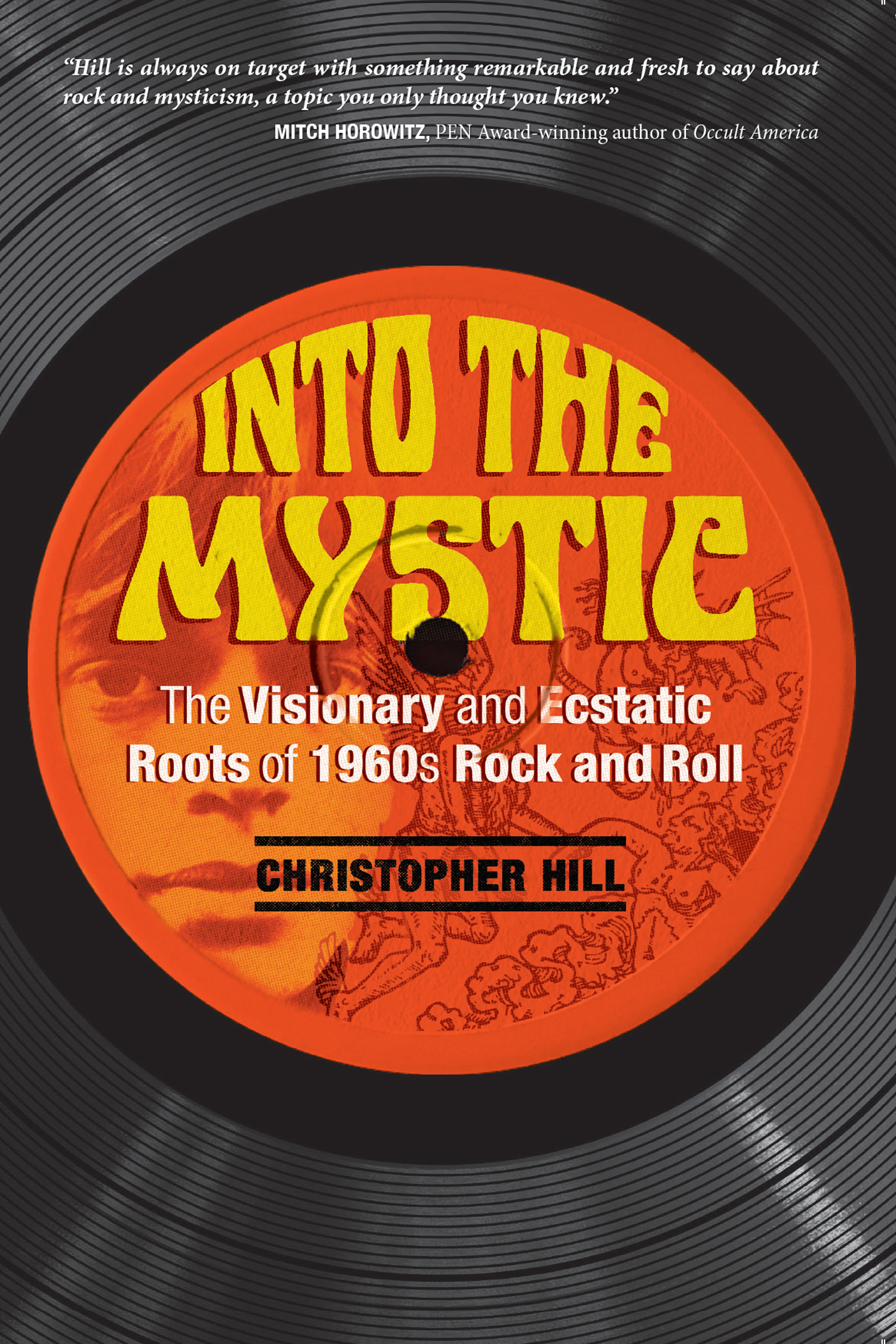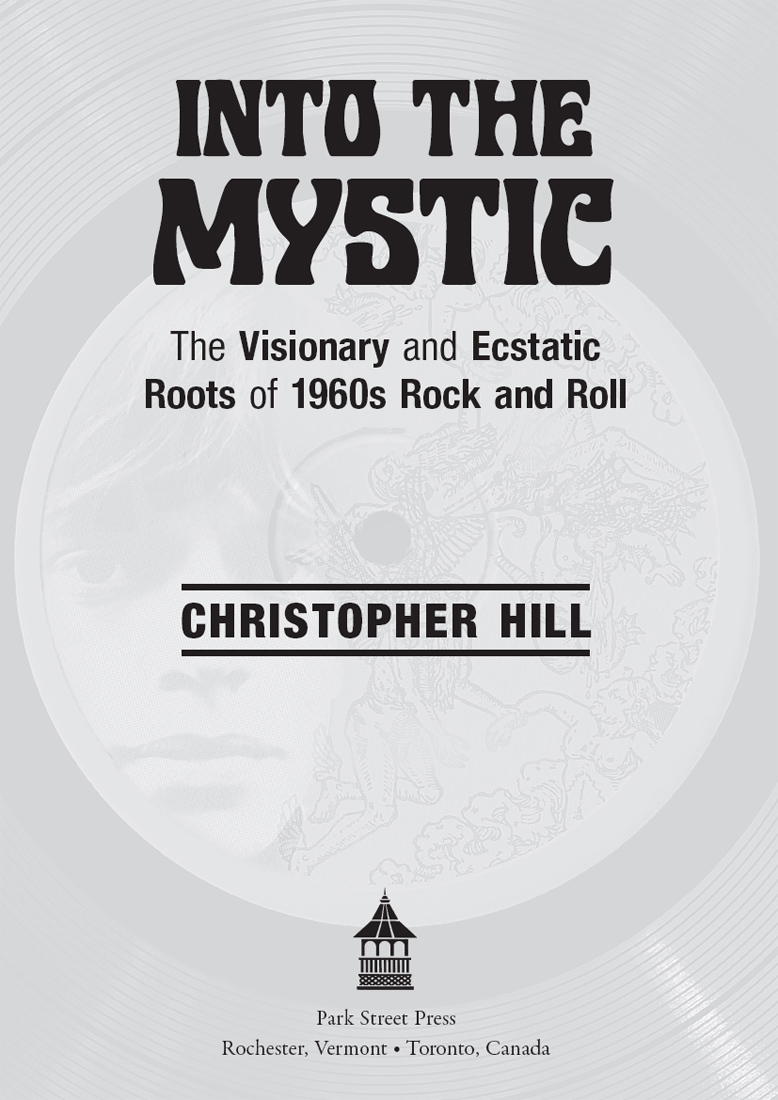To Emma and Evan

One generation got old
One generation got soul
INTO THE MYSTIC

I have rarely read a book about the occult and modern culture with so many original insights. Christopher Hill zigs when others zag. He is always on target with something remarkable and fresh to say about rock and mysticism, a topic you only thought you knew.
MITCH HOROWITZ, PEN AWARD-WINNING AUTHOR OF OCCULT AMERICA AND ONE SIMPLE IDEA: HOW POSITIVE THINKING RESHAPED MODERN LIFE
Like a third eye opening, Into the Mystic illuminates the spiritual awakening that gave popular music its messianic fervor in the renaissance era that heralded the 1960s. The scope of Christopher Hills inquiry refracts like a psychedelic prism, with a sense of wonder at the tale unfolding and an appreciation of why it continues to fascinate and resonate within our highest consciousness.
LENNY KAYE, MUSICIAN AND PRODUCER OF THE COMPILATION ALBUM NUGGETS: ORIGINAL ARTYFACTS FROM THE FIRST PSYCHEDELIC ERA, 19651968
What would a history look like that took the rhythms, beats, dances, and trance states of blues, gospel, and rock n roll as seriously as it took elections, wars, and arrogant men? It would be a poetic history of numinous desire, ecstatic release, and freedom. It would intuit and then trace an African-American-British visionary tradition aching as much with the sufferings of American chattel slavery and the psychedelic trips of the counterculture as the mythical channelings of William Blake. It would not look away from either the utopian hopes or the horrible failures and fundamentalist backlashes. It would look, in fact, like this weird and wonderful book.
JEFFREY J. KRIPAL, AUTHOR OF ESALEN: AMERICA AND THE RELIGION OF NO RELIGION
Into the Mystic is a fascinating and inspiring read, providing extensive knowledge and brilliant insights carried by eloquent and, at times, poetic writing. And most important, its a compelling articulation of the centrality of visionary artand in particular 1960s rock-and-roll musicin the promise that the division between Heaven and Earth can be repealed. Christopher Hill places the rock music of the 1960s in its proper historical lineage as a cultural phenomenon far beyond mere entertainment, indeed central to the consciousness transformation revolutionthe psychedelic renaissance that seemed to stall or at least dramatically wane in the 1970s. An erudite, eloquent, and potent love song to the liberating spirit of 1960s rock musicits connection to the lineage of the secret garden (the secret eternal revolution) and the ancient danceand its relevance to the continuing urgent need for a yet deeper liberation of soul and society. A treasure trove of brilliant and unexpected revelations.
STEPHEN GRAY, TEACHER, SPEAKER, CONFERENCE ORGANIZER, AND AUTHOR OF CANNABIS AND SPIRITUALITY: AN EXPLORERS GUIDE TO AN ANCIENT PLANT SPIRIT ALLY AND RETURNING TO SACRED WORLD: A SPIRITUAL TOOLKIT FOR THE EMERGING REALITY
ACKNOWLEDGMENTS
With gratitude
To Jon Graham at Inner Traditions, and Mindy Branstetter, Erica Robinson, Manzanita Carpenter, and Patricia Rydle; and Cannon Labrie, urbane rock-and-roll editor.
And to my agent, Susan Schulman, generous with time, support, and sound counsel.
To the late Ian MacDonald for opening up new worlds of thinking about the Beatles and their era.
To my brother Andrew for bringing all the records home.
And of course always to Boo, who holds fast, and makes everything else possible.
Dark and cold we may be, but this
Is no winter now. The frozen misery
Of centuries breaks, cracks, begins to move.
The thunder is the thunder of the floes,
The thaw, the flood, the upstart Spring.
Thank God our time is now when wrong
Comes up to face us everywhere,
Never to leave us till we take
The longest stride of soul we humans ever took.
Affairs are now soul size.
The enterprise
Is exploration into God.
Where are you making for? It takes
So many thousand years to wake,
But will you wake, for pitys sake?
CHRISTOPHER FRY,
FROM A SLEEP OF PRISONERS
INTRODUCTION
A SCHOOL OF VISION
Thirty years ago it was as if rock music had tapped into a wellspring where Being gushed forth in a play of light and sound that was free and unnamed and not yet frozen into the forms that history and culture demand. It was as if one knew that the wisest cultures find a way to preserve the knowledge of this fountain, an esoteric knowledge hidden from ordinary sight, and it was as if rock music was the way our culture had found, entrusting a cohort of vagabond misfits with this light of the ages.
NICK BROMELL, TOMORROW NEVER KNOWS (2000)
IN 1871 a sixteen-year-old Arthur Rimbaud wrote to a friend saying, I want to be a poet, and Im working to make myself a visionary. The word he used was voyant, which can also be translated as seer, or even mediuma clair-voyanta person sensitive to things beyond the natural range of perception.
I hardly know how to explain it to you, Rimbaud went on. The point is to arrive at the unknown through derangement of all the senses. In Rimbauds eyes the poets of his day had lost sight of their ancient function. It is all rhymed prose, a game, he said of contemporary poetry, the... glory of innumerable generations of idiots. Poets had fallen into a stupid sleep, and no longer saw into the unknown.

Fig. I.1. Arthur Rimbaud at the age of seventeen (photo by tienne Carjat)
Rimbaud is one of the household deities of rock and roll. Like the family ghost, he pops up at significant junctures. Bob Dylan starts haranguing his friends about Rimbaud in 1963 as he is letting go of the formal constraints of topical folk music, beginning to derange his own senses, and starting work on the surreal rock and roll that will climax with Blonde on Blonde.
Rimbauds was not a completely new complaint. Across the preceding century, as technology, materialism, and industrial capitalism were defoliating the imaginative landscape of Europe, certain artists like William Blake had been crying out that the daimonic sources of their ancient calling were being chased out of the world, that art had lost its psychic charge. A new kind of art was needed that would expand visiona visionary artan art that would change the way people saw. An initiatory art. A psychedelic art.
Since that time various schools of painters, composers, and writers have taken shape in response to this perceived crisis. A school in this sense refers to an informal grouping of artists, maybe not even recognized as a group at the time, who might be working in the same medium, or are perhaps linked by generation, by shared and mutual influence, by cultural affinities and parallel interests.


